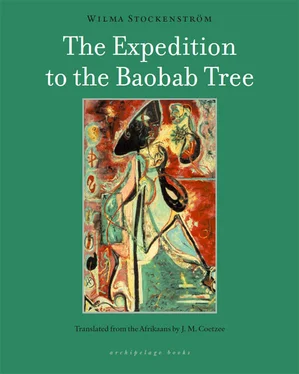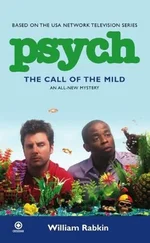Wilma Stockenstrom
The Expedition to the Baobab Tree
WITH BITTERNESS, then. But that I have forbidden myself. With ridicule, then, which is more affable, which keeps itself transparent and could not care less; and like a bird into a nest I can slip back into a tree trunk and laugh to myself. And keep quiet too, perhaps just keep quiet so as to dream outward, for the seventh sense is sleep.
In the past, time often caused trouble when I still wanted to have more than day and night was obsessed with counting and uncertain whether the times during the day when I dozed should be reckoned as night, where night was the eventless and day the busy. Sleep as night. How I sometimes stretched out my nights, curling myself up into the smallest possible bundle in the darkest hollow, forehead pressed against knees to kill the gnawing within myself, entangled in confused thoughts, and fixed on a color to which I held myself so that I could later say, my sleep was blue, or living red like blood, or a grey transitional shade. I woke up crumbled, sat up lightheaded, unsteady, and set a dusty foot down in the great assegai blade of sunlight that bores all day with a steady murderous twist into my dwelling.
That was the time before the beads. The time after the beads can be handled more easily. If I treat myself to sleep so often, it is no longer by chance and for a long while has not been an escape. Then only do I live, I tell myself.
With the beads began my determined effort at dating. I picked them up some days ago, and only later got the idea. I added the new find to the heap of potsherds that curiosity had led me to collect on my trips of varying distances from the tree, hesitant, bored, frustrated trips away from the path to the water that I had by then almost recognizably tramped.
Like the wild animals I make my paths. This conclusion came later. Like the redbuck, no, not like the redbuck and the zebra, not like the buffalo or herd animals of whatever kind that supplement each other’s senses and confront crises together and survive what alone they would be too weak for, and that yet fall prey as individuals, and yet die alone, each in his time. I tread my track, so clearly purposeful that I know I have already dwelt a long time in these parts, or rather there has never been any question of dwelling. Rather I should say: I too survive here, but I rely on myself, and even on the days when it feels as if everywhere under the earth there are snake eggs lying, even then I have to fend for myself and try not to tread on them.
My path to the stream, made by me who tread so lightly, thin, faintly winding, weaving past bush and tree trunk and through flat grass plains where the winter is beginning to lie red — my path runs down a final sudden slope to sun-irradiated water wide as my outstretched arms between the trunks of two young matumi trees guarding my drinking place. Further downstream I wash. Higher up, where this tributary debouches into the main stream, is the elephants’ ford.
The time when I nearly landed under the feet of the herd, I thought of a riddle that we young girls used to ask each other: What carries its life in its stomach? It must have been all the rumbling bellies that made me giggle anxiously for a moment and then left my throat quite dry in my meager hiding place, with a stone ridge and reeds between them and me. The horde of feet trod springily past me into the pool, the water splashed, they bathed calmly. I shrank into myself. No one grows up under such close protection as a slave girl. I can also add, no one grows up as ignorant as a slave girl, and even I, the shining exception, seem to be stupid when it comes to wild animals and their habits, with my knowledge restricted to items of information about the ivory trade. Every other season an elephant swallows a pebble down, and the pebbles rattle around in their tremendous bellies all their lives, rattle and rattle. Whatever is incomprehensibly huge I reduced to the ridiculous to be able to assimilate it and prove my power over it, while I knelt comically curled up behind stone and reed, a slug without a shell, a soft-shelled beetle as big as the top of my little finger, anxiously in sham death, waiting for the long drawn-out gambols to come to an end so that I could again stand up like a human being and look around. A last trumpeting from the far bank, then I came stiffly erect and brushed the damp sand from me and shivered in the breeze that bent the reeds.
Now I live in friendship with the herd whose ford and bathing place I accidentally trespassed on. Friendship a condescending misnomer, however. I live. They live. Sometimes from my higher ground I see the bent backs milling in the faraway glint of the water, I hear the trumpeting, see pairs of tusks raised momentarily, and still I struggle to make the spectacle cohere with the smooth bracelet that once I could wear. There are connections that evade me.
If I cannot even know everything on the short walk from the entrance to the baobab to the heap of potsherds and other finds, so many steps there, so many back, what of my journey, which sometimes feels as if it took a lifetime and still lasts, still goes on, even if now I am traveling in circles around one place?
So many steps there, with feet already tiring. What did I think I was collecting when I carried it all here …? What did I think I was going to achieve with rubbish …? Time becomes beads and thus rubbish.
On the many paths of my memory there arise threatening figures that block every backward glance. I know these figures. I cannot name them. They loom up before me in the form of something human or sometimes like the corner of a hairy wall or a rolling hut opening that tries to swallow me and drag me off, an opening that storms down in a rage, storms down at a tremendous speed, and then a yard from me suddenly swerves away and saunters and entices me; sometimes too a quiet misshapenness of expectation followed by a noticeable dejection when the multitude of sharp pincers that grip me turn into the slack tendrils of a thicket, when the whole business disappears without further ado leaving an unfathomable grey behind. There are more tracks crisscrossing in my memory than I ever actually saw in a lifetime. What would I not have been able to track down if it had been granted to me and if my detective talent were not so frequently thwarted and the trail petered out inside me?
All kinds of paths leading nowhere radiate from my dwelling. They were not laid on. They came like that. Certainly when I arrived here I used the animal tracks because there was nothing else available except the paths to nowhere, but I soon had to conclude that my way of thinking did not slot in with that of other beings here. And I searched and opened a way and found.
Found, I say. Terrifying.
The most important item, water, I did not have to search for. There is plenty of it. It is visible and audible. I scoop the rippling of the stream up in my gift shell of ostrich egg. I hold the shell in the clear bow of water that leaps over a rough stone so as to catch the light and the sound. Again and again I scoop like this, and pour the water spirit’s flickering and murmuring into my gift clay pot. Then I lift the full pot slowly with both hands onto my head, stoop from the knees to pick up my scoop shell, and walk back along the water path to the baobab.
Found: all kinds of veld foods; and found too that I was plucking, digging, picking them up in competition with animals, that trees did not bud and blossom and bear fruit for me to still my hunger, that tubers and roots did not swell underground for me, that not to please me did the greenheart tree drip its nectar, and not to refresh me did the flat crown stand at strategic points in the middle of a patch of shade, and not to give me pleasure did the flecked orchids display themselves, not for me did the violet tree put up tents of scent in early summer.
Читать дальше












